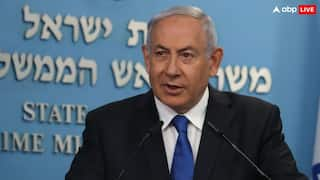Laws The Chief Minister Of Jammu & Kashmir Can And Cannot Make — A Detailed Breakdown
As the newly appointed Chief Minister of Jammu and Kashmir, Omar Abdullah's powers are limited compared to other state Chief Ministers. Here's what he can and cannot do:

Immediately after assuming office as the Chief Minister of the Union Territory of Jammu and Kashmir, Omar Abdullah posted a picture of himself at the desk in his office with the caption 'I'm back.' The quote Abdullah used was famously popularized by NBA legend Michael Jordan, who paused his basketball career in 1993 to explore options in baseball. In 1995, Jordan announced his return to the NBA in a two-word press release: 'I'm back.' Perhaps Abdullah was referring to his last stint as Chief Minister from 2009 to 2015, but much has changed in Jammu and Kashmir. Since then, Article 370, which provided autonomy in its right to the state, has been abrogated, and the state of Jammu and Kashmir has been reorganised as a Union Territory.
BREAKING NEWS | J&K Cabinet Passes Resolution For Restoration Of Statehood, CM Omar Abdullah To Meet PM Modi
The functioning of the government in Jammu and Kashmir will now be starkly different in terms of administration, judiciary, and executive power compared to when the last assembly elections were conducted in 2014. Under Union Territory governance laws, Jammu and Kashmir will have the same rules applied as they are in the Union Territory of Puducherry.
The Chief Minister of Jammu and Kashmir holds limited powers compared to the Chief Ministers of other states. Since Jammu and Kashmir is a Union Territory, the Centre retains significant control over its laws. Additionally, any laws enacted by the Union Territory must align with the policies and guidelines set by the Centre. This is due to the Centre's authority to legislate on matters such as public order and policing, which are critical to governance. Moreover, the Lieutenant Governor, appointed by the President, holds the authority to act independently in matters that fall beyond the legislative powers of the Assembly.
ABP LIVE IN PAKISTAN | India And Pakistan Wasted 77 Years, Next 77 Years Shouldn’t Be So: Nawaz Sharif - GROUND REPORT
Just mentioning a brief on all the laws that the newly appointed Chief Minister Omar Abdullah will be able to conduct or not be able to do:
Laws The CM Of Jammu And Kashmir Can Enact
The Chief Minister of the Union Territory of Jammu and Kashmir has the authority to create legislation in several local sectors. These areas primarily focus on the governance and well-being of the people within the UT. The laws that can be enacted include:
1. Municipal Laws: The CM can create regulations regarding local governance, such as the Jammu and Kashmir Municipal Act.
2. Panchayati Raj Laws: Legislation related to the local self-government at the village level, such as the Jammu and Kashmir Panchayati Raj Act.
3. Education Laws: Laws aimed at shaping the education system, like the Jammu and Kashmir Education Act.
4. Health Laws: Policies affecting public health, such as the Jammu and Kashmir Health Act.
5. Agriculture Laws: Laws governing farming practices, like the Jammu and Kashmir Agriculture Act.
6. Tourism Laws: Legislation to promote and regulate tourism, as seen in the Jammu and Kashmir Tourism Act.
7. Transport Laws: Regulations about the UT’s transportation systems, including the Jammu and Kashmir Transport Act.
8. Labour Laws: Laws pertaining to the welfare and rights of workers, like the Jammu and Kashmir Labour Act.
9. Social Welfare Laws: Enactments supporting the vulnerable and needy, such as the Jammu and Kashmir Social Welfare Act.
Laws The CM Of Jammu and Kashmir Cannot Enact
There are several crucial legislative areas that the Chief Minister cannot directly influence, as these fall under the purview of the central government. These include:
1. Taxation Laws: Matters related to income tax, GST, and other central taxes.
2. Defence and Military Laws: Policies concerning national defence are entirely controlled by the Centre.
3. Foreign Policy Laws: All matters relating to foreign affairs are out of the CM's jurisdiction.
4. National Security Laws: Enacting laws concerning internal and external security lies with the Centre.
5. Citizenship Laws: The UT government has no say in legislation related to citizenship.
6. Constitutional Amendment Laws: Amending the Indian Constitution is beyond the authority of the UT government.
7. Laws on Union Territories: General legislation related to UTs, except those specific to Jammu and Kashmir.
8. Centre-State Relations: Legislation affecting the relationship between the Centre and states is controlled by the Union government.
9. Interstate Trade and Commerce Laws: Trade laws that transcend state borders are governed centrally.
10. National Highways and Railways Laws: The maintenance and regulation of national highways and railways fall under the central government.
Restricted Laws (Require Centre's Approval)
Some laws can be proposed by the CM but require approval from the central government:
1. Police Laws: Laws related to policing need the Centre's endorsement.
2. Land Revenue Laws: The Centre must approve any changes in land revenue legislation.
3. Electricity Laws: Policies on power supply and distribution also require central oversight.
4. Water Resources Laws: The management of water resources falls under the same category of central approval.
Special Provisions
Certain constitutional provisions and legal frameworks give the Centre significant control over Jammu and Kashmir's legislative powers:
1. Article 239 of the Indian Constitution: Grants the Centre authority to direct Union Territories.
2. Jammu and Kashmir Reorganization Act, 2019: Provides the Centre with oversight on laws passed in the Union Territory.
3. Lieutenant Governor's Role: Some laws require the Lieutenant Governor’s approval before they are enacted.





























